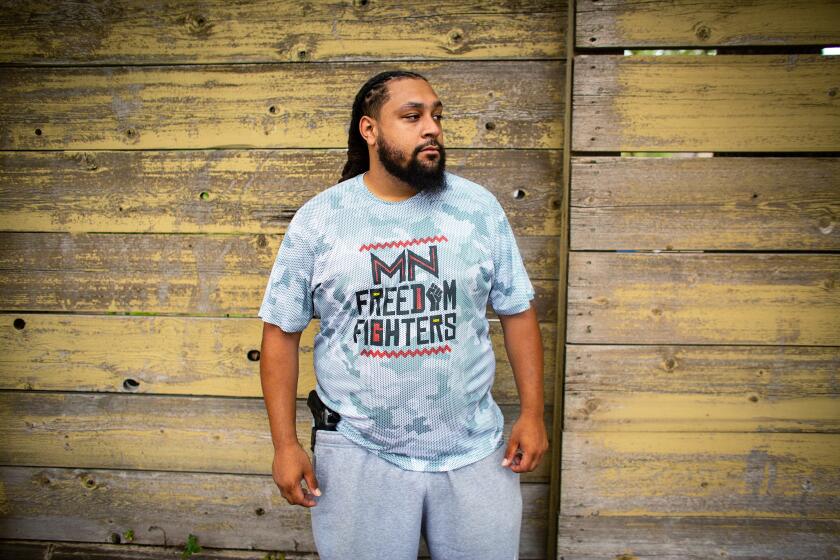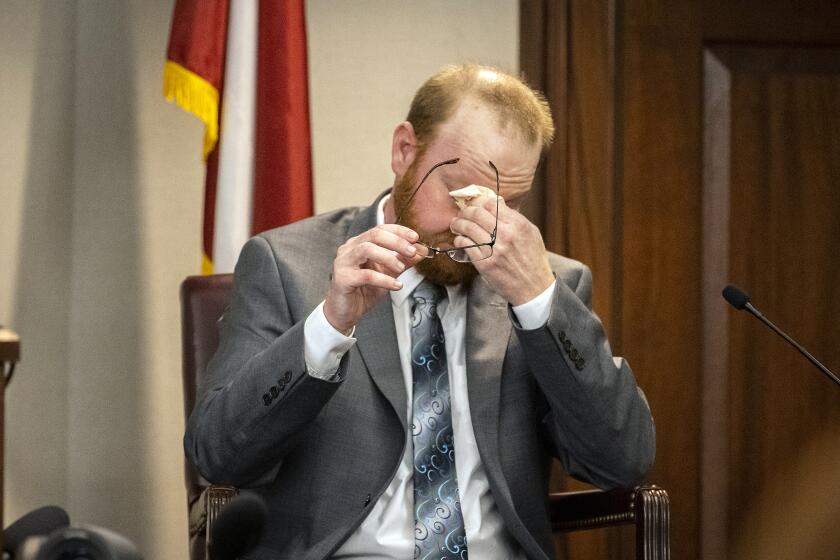Ahmaud Arbery’s killers ask court to overturn hate crime convictions

- Share via
ATLANTA — Attorneys for three white men who chased and killed Ahmaud Arbery in a Georgia subdivision asked a federal appeals court Wednesday to throw out their hate crime convictions, arguing that prosecutors relied on their history of racist comments without proving they targeted Arbery because he was Black.
“At the end of the day, this issue isn’t about the racism of these defendants,” A.J. Balbo, representing Greg McMichael, told a three-judge panel of the U.S. 11th Circuit Court of Appeals in Atlanta. “It’s about whether or not the government met its burden.”
Defense attorneys also went beyond the core issue of whether a racist intent to harm motivated the Feb. 23, 2020, pursuit that ended with Arbery shot dead in the street. They raised legal technicalities, including their contention that prosecutors failed to prove Arbery was killed on a public road.
Federal prosecutors countered that the trial jury in 2022 heard sufficient evidence to find the trio guilty of hate crimes as well as attempted kidnapping. Racist views evidenced by the men’s prior text messages and social media posts, they said, informed their mistaken assumption that Arbery was a fleeing criminal.
“The hate-fueled violence the defendants inflicted on Ahmaud is precisely the type of conduct that Congress targeted when it passed the Civil Rights Act,” said Brant Levine, an attorney for the Justice Department’s civil rights division.
Father and son Greg and Travis McMichael armed themselves with guns and used a pickup truck to chase Arbery after spotting the 25-year-old man running in their neighborhood outside the port city of Brunswick. A neighbor, William “Roddie” Bryan, joined the pursuit in his truck and recorded cellphone video of Travis McMichael shooting Arbery at close range with a shotgun.
The three white men who fatally shot Ahmaud Arbery were found guilty of violating his civil rights and targeting him because he was Black.
More than two months passed without arrests, until Bryan’s graphic video of the killing leaked online and a national outcry erupted over Arbery’s death. The Georgia Bureau of Investigation took over the case from local police and charges soon followed.
All three men were convicted of murder in a Georgia state court in late 2021, followed months later by the federal hate crimes trial.
In their oral arguments and legal briefs, lawyers for Greg McMichael and Bryan cited the prosecutors’ use of more than two dozen social media posts and text messages, as well as witness testimony, that showed all three men using racist slurs or otherwise disparaging Black people.
Bryan’s attorney, Pete Theodocion, called it “some of the ugliest, most repulsive evidence any of us have ever heard in a trial,” and explosive enough that prosecutors could sway a jury without proving a racist intent to harm Arbery himself.
“When the jury hears that evidence, we have to make sure that the government is actually presenting some evidence as to all the essential elements of crimes because it is such an uphill battle,” Theodocion told the judges.
Balbo said Greg McMichael initiated the pursuit of Arbery because he mistakenly suspected him of being a fleeing criminal. He had seen security camera videos in prior months that showed Arbery entering a neighboring home under construction.
Armed Black groups like the Minnesota Freedom Fighters work to protect the streets as calls for racial justice mount.
When Arbery ran past the McMichaels’ home , Balbo argued, Greg McMichael recognized him from those videos “by his height, his weight, his tattoos, his manner of dress.”
“If this person had been a 60-year-old Black man, Greg McMichael would not have engaged him,” Balbo said. “The race was a noncontributing role in this matter.”
One of the judges sounded skeptical. Judge Britt Grant, nominated to the appeals court by former President Trump, said the trial evidence of racist intent behind Arbery’s killing “seems pretty overwhelming to me.”
None of the videos showed Arbery stealing, and police found no stolen property or weapons on his body.
Judge Elizabeth “Lisa” Branch, another Trump nominee; and District Judge Victoria Calvert, who was nominated by President Biden to the federal bench and is serving temporarily on the 11th Circuit, also heard the arguments. The judges did not indicate how long they might take to rule.
The legal technicalities raised by the defense included Travis McMichael’s attorney, Amy Lee Copeland, arguing that prosecutors failed to prove the streets of the Satilla Shores subdivision where Arbery was killed were public roads, as stated in the indictment used to charge the men.
Copeland cited records of a 1958 meeting of Glynn County commissioners in which they rejected taking ownership of the streets from the subdivision’s developer. Prosecutors countered that service request records and trial testimony from a county official showed the streets had been maintained by the county government for decades.
The man who fatally shot Ahmaud Arbery has testified Arbery attacked him and grabbed his shotgun after he and two other white men pursued the 25-year-old Black man in their Georgia neighborhood.
Theodocion also argued that using their pickup trucks to cut off Arbery’s escape from the neighborhood didn’t amount to attempted kidnapping. He said the charge was improper because the men weren’t seeking ransom or some other benefit, an element required to prove the charge as a federal crime.
Levine countered that the McMichaels and Bryan sought the “satisfaction of catching a Black man that they assumed to be a criminal on the streets of their neighborhood.”
The trial judge sentenced both McMichaels to life in prison for their hate crime convictions, plus additional time — 10 years for Travis McMichael and seven years for his father — for openly carrying guns while committing violent crimes. Bryan received a lighter hate crime sentence of 35 years in prison, in part because he wasn’t armed and preserved the cellphone video that became crucial evidence.
All three also received 20 years for attempted kidnapping, to overlap with their hate crime sentences.
If the U.S. appeals court overturns any of their federal convictions, both McMichaels and Bryan would remain in prison. All three are serving life sentences in Georgia state prisons for murder and have motions for new state trials pending before a judge.
Kate Brumback and Russ Bynum write for the Associated Press. Bynum reported from Savannah, Georgia.
More to Read
Sign up for Essential California
The most important California stories and recommendations in your inbox every morning.
You may occasionally receive promotional content from the Los Angeles Times.












